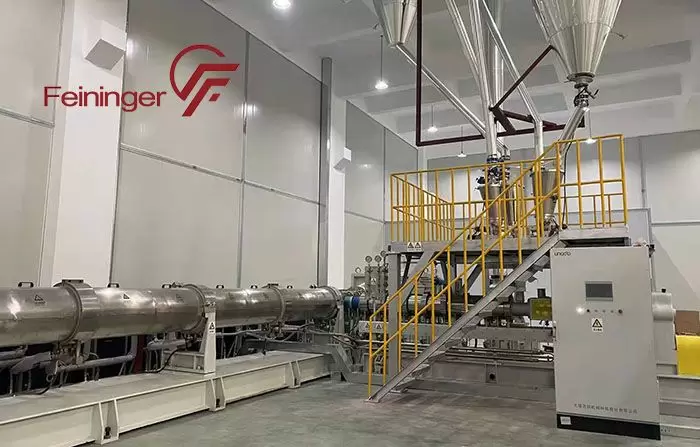The demand for lightweight, durable, and versatile materials has grown significantly in industries such as aerospace, automotive, and construction. PET foam cores have emerged as a popular choice due to their excellent mechanical properties and sustainability. As a result, innovations in PET Foam Core Production Lines are crucial for meeting the rising demand and enhancing production efficiency. In this article, we will explore the latest advancements in PET foam core production technology and how they contribute to improving efficiency and sustainability.

The Importance of PET Foam Cores
PET foam cores are valued for their lightweight structure, excellent thermal insulation, and strong mechanical properties. They are widely used in composite sandwich structures, offering an ideal balance of performance and weight reduction. As industries continue to seek sustainable alternatives to traditional materials, PET foam cores provide an environmentally friendly solution due to their recyclability and reduced carbon footprint.
Latest Innovations in PET Foam Core Production Lines
1. Advanced Extrusion Technology
Extruded PET Foam Production Lines are at the forefront of technological advancements, allowing for the production of high-quality foam cores with consistent properties. Recent innovations focus on improving the extrusion process to achieve better control over foam density, cell size, and mechanical strength.
-
Precision Control: Modern extrusion lines utilize advanced control systems to ensure uniformity in foam properties. This precision results in consistent product quality and reduced material waste.
-
High Output and Stability: The latest extrusion lines are designed for high output while maintaining strong stability, ensuring reliable performance even in high-demand production environments.
2. Energy Efficiency and Sustainability
With growing concerns about environmental impact, PET foam core production lines are increasingly focused on energy efficiency and sustainability.
-
Low Energy Consumption: Innovations in extrusion technology have led to significant reductions in energy consumption. This not only lowers production costs but also minimizes the environmental footprint of the manufacturing process.
-
Sustainable Materials: By utilizing recycled PET materials, production lines contribute to a circular economy, reducing waste and promoting the use of renewable resources.
3. Modular and Customizable Designs
Manufacturers are adopting modular designs to enhance the flexibility and adaptability of their production lines. This allows for customization based on specific production requirements, ensuring optimal performance and efficiency.
- Feininger’s Modular PET Sheet Extrusion Lines: Feininger, a leading manufacturer in China, offers modular PET sheet extrusion lines that can be customized to meet diverse production needs. Their machines are designed for high performance, durability, and versatility, making them a preferred choice for companies in the plastics industry.
4. Improved Automation and Process Control
Automation plays a crucial role in modern PET foam core production lines, enhancing efficiency and reducing the potential for human error.
-
Automated Quality Control: Advanced sensors and monitoring systems automatically detect deviations in product quality, allowing for real-time adjustments and ensuring consistent output.
-
Smart Process Management: Integration of IoT and AI technologies enables smarter process management, optimizing production parameters for maximum efficiency and minimal waste.
Global Reach and Applications
The advancements in PET Foam Core Production Lines have enabled their widespread adoption across more than ten countries and regions worldwide. These production lines are favored by users for their high machine quality, strong stability, and significant output capacity. Industries that benefit from these innovations include:
-
Aerospace: PET foam cores provide lightweight solutions for aircraft structures, contributing to fuel efficiency and performance.
-
Automotive: Used in body panels and interior components, PET foam cores reduce vehicle weight, enhancing fuel economy and reducing emissions.
-
Construction: PET foam cores offer excellent insulation properties, making them ideal for energy-efficient building applications.
Conclusion
The latest innovations in PET foam core production technology are driving efficiency and sustainability in the manufacturing process. By embracing advanced extrusion technology, energy-efficient practices, and automation, manufacturers can meet the growing demand for high-quality PET foam cores. Companies like Feininger in China are leading the way with modular and customizable production lines that deliver exceptional performance and long-term stability.
As industries continue to prioritize lightweight and sustainable materials, PET foam cores will play an increasingly vital role in shaping the future of manufacturing. With ongoing advancements and global adoption, the PET foam core production line industry is poised for continued growth and success.

